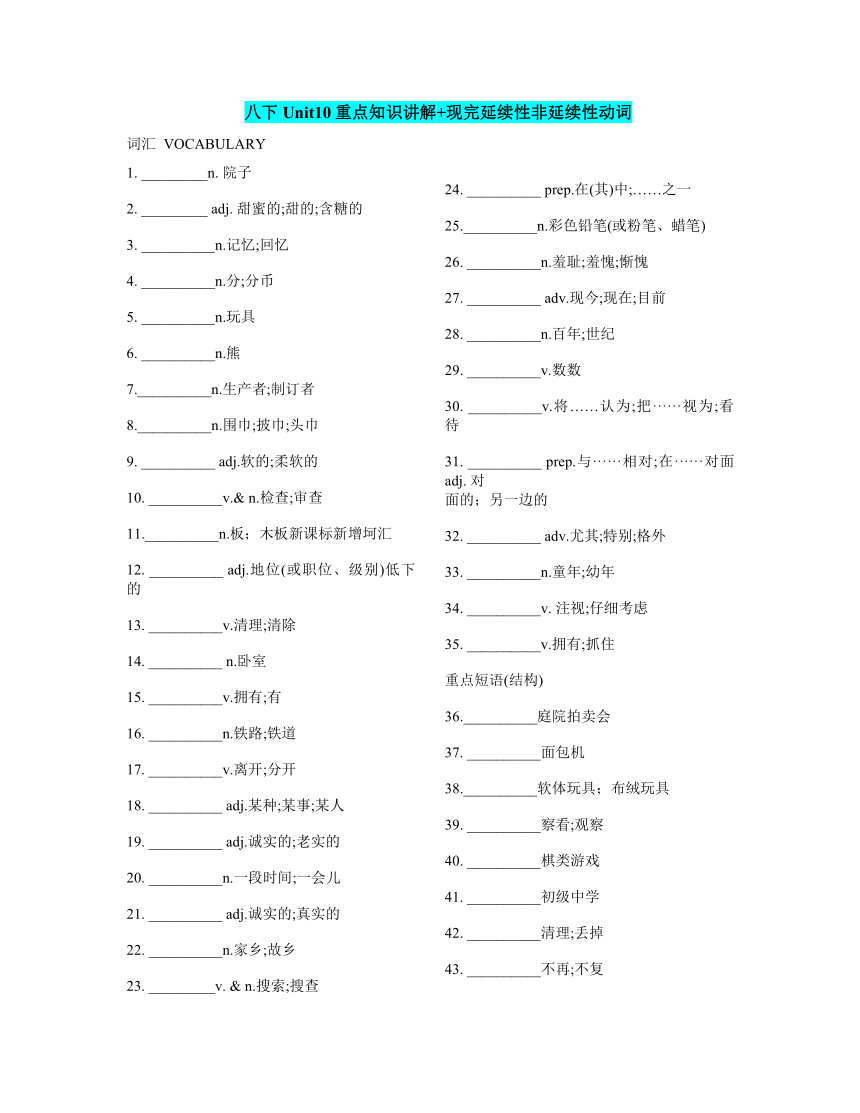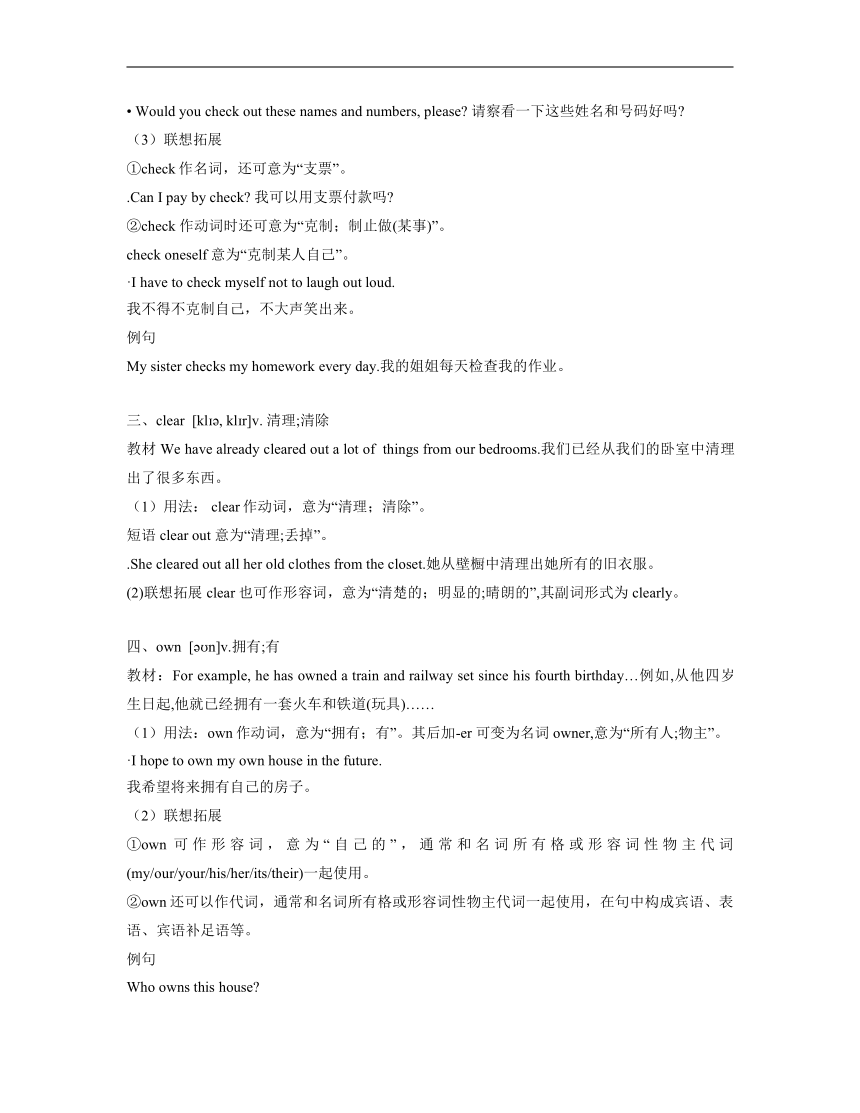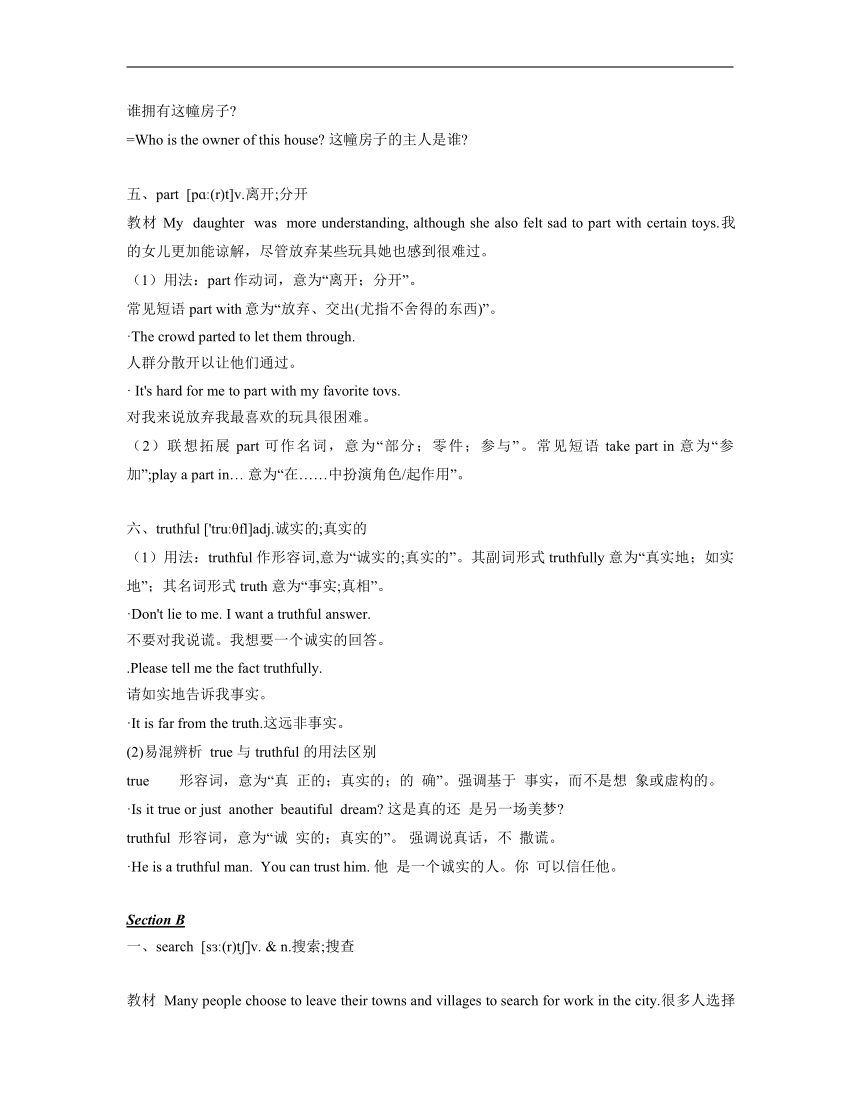Unit10 I've had this bike for three years重点知识讲解+现完延续性非延续性动词讲义(含答案)人教版八年级英语下册
文档属性
| 名称 | Unit10 I've had this bike for three years重点知识讲解+现完延续性非延续性动词讲义(含答案)人教版八年级英语下册 |  | |
| 格式 | docx | ||
| 文件大小 | 34.1KB | ||
| 资源类型 | 教案 | ||
| 版本资源 | 人教新目标(Go for it)版 | ||
| 科目 | 英语 | ||
| 更新时间 | 2024-06-03 19:28:35 | ||
图片预览




文档简介
八下Unit10重点知识讲解+现完延续性非延续性动词
词汇 VOCABULARY
1. _________n. 院子
2. _________ adj. 甜蜜的;甜的;含糖的
3. __________n.记忆;回忆
4. __________n.分;分币
5. __________n.玩具
6. __________n.熊
7.__________n.生产者;制订者
8.__________n.围巾;披巾;头巾
9. __________ adj.软的;柔软的
10. __________v.& n.检查;审查
11.__________n.板;木板新课标新增坷汇
12. __________ adj.地位(或职位、级别)低下的
13. __________v.清理;清除
14. __________ n.卧室
15. __________v.拥有;有
16. __________n.铁路;铁道
17. __________v.离开;分开
18. __________ adj.某种;某事;某人
19. __________ adj.诚实的;老实的
20. __________n.一段时间;一会儿
21. __________ adj.诚实的;真实的
22. __________n.家乡;故乡
23. _________v. & n.搜索;搜查
24. __________ prep.在(其)中;……之一
25.__________n.彩色铅笔(或粉笔、蜡笔)
26. __________n.羞耻;羞愧;惭愧
27. __________ adv.现今;现在;目前
28. __________n.百年;世纪
29. __________v.数数
30. __________v.将……认为;把······视为;看待
31. __________ prep.与······相对;在······对面 adj. 对
面的;另一边的
32. __________ adv.尤其;特别;格外
33. __________n.童年;幼年
34. __________v. 注视;仔细考虑
35. __________v.拥有;抓住
重点短语(结构)
36.__________庭院拍卖会
37. __________面包机
38.__________软体玩具;布绒玩具
39. __________察看;观察
40. __________棋类游戏
41. __________初级中学
42. __________清理;丢掉
43. __________不再;不复
44.__________放弃、交出(尤指不舍得的东西)
45. __________至于;关于
46. __________说实在的
47. __________依据;按照
48. __________几乎;接近
答案 1. yard 2. sweet 3. memory 4. cent 5. toy 6. bear 7. maker 8. scarf 9. soft 10. check 11. board
12. junior 13. clear 14. bedroom 15. own 16. railway 17. part 18. certain 19. honest 20. while 21. truthful 22. hometown 23. search 24. among 25. crayon 26. shame 27. nowadays 28. century 29. count 30. regard 31. opposite 32. especially 33. childhood 34. consider 35. hold 36. yard sale 37. bread maker 38. soft toy 39. check out 40. board game 41. junior high school 42. clear out 43. no longer 44. part with 45. as for 46. to be honest 47. according to 48. close to
Section A
一、memory ['mem ri]n.记忆;回忆
教材Amy wants to keep her old things because they bring back sweet memories.埃米想保留她的物,因为它们能勾起甜蜜的回忆。
用法: memory在此处作可数名词,意为“记忆;回忆”。
·I have a bad memory for names.
我不善于记名字。
联想拓展
①memory意为“记忆力;记性”时是不可数名词。lose one's memory 意为“失去记忆”。
.David often forgets things. His memory is poor.戴维经常忘记事情。他的记忆力差。湖北天门中考
②memorize v.记忆;记住
·It's hard to memorize these words.
记住这些单词很难。
二、check [t ek]v. & n.检查;审查
教材And check out these soft toys and board games for younger kids.再看看这些给较小的孩子们的布绒玩具和棋类游戏。
(1)用法 check 既可作动词,又可作名词,意为 “检查;审查”。check out为固定短语, 意为“察看;观察”。
Do look out for spelling mistakes when you check your homework.当你检查你的家庭作业时,要留心拼写错误。
Would you check out these names and numbers, please 请察看一下这些姓名和号码好吗
联想拓展
①check作名词,还可意为“支票”。
.Can I pay by check 我可以用支票付款吗
②check 作动词时还可意为“克制;制止做(某事)”。
check oneself 意为“克制某人自己”。
·I have to check myself not to laugh out loud.
我不得不克制自己,不大声笑出来。
例句
My sister checks my homework every day.我的姐姐每天检查我的作业。
三、clear [kl , kl r]v. 清理;清除
教材 We have already cleared out a lot of things from our bedrooms.我们已经从我们的卧室中清理出了很多东西。
(1)用法: clear作动词,意为“清理;清除”。
短语 clear out 意为“清理;丢掉”。
.She cleared out all her old clothes from the closet.她从壁橱中清理出她所有的旧衣服。
(2)联想拓展 clear 也可作形容词,意为“清楚的;明显的;晴朗的”,其副词形式为 clearly。
四、own [ n]v.拥有;有
教材:For example, he has owned a train and railway set since his fourth birthday…例如,从他四岁生日起,他就已经拥有一套火车和铁道(玩具)……
(1)用法:own作动词,意为“拥有;有”。其后加-er 可变为名词owner,意为“所有人;物主”。
·I hope to own my own house in the future.
我希望将来拥有自己的房子。
联想拓展
①own可作形容词,意为“自己的”,通常和名词所有格或形容词性物主代词(my/our/your/his/her/its/their)一起使用。
②own还可以作代词,通常和名词所有格或形容词性物主代词一起使用,在句中构成宾语、表语、宾语补足语等。
例句
Who owns this house
谁拥有这幢房子
=Who is the owner of this house 这幢房子的主人是谁
五、part [pɑ (r)t]v.离开;分开
教材 My daughter was more understanding, although she also felt sad to part with certain toys.我 的女儿更加能谅解,尽管放弃某些玩具她也感到很难过。
用法:part作动词,意为“离开;分开”。
常见短语 part with意为“放弃、交出(尤指不舍得的东西)”。
·The crowd parted to let them through.
人群分散开以让他们通过。
· It's hard for me to part with my favorite tovs.
对我来说放弃我最喜欢的玩具很困难。
(2)联想拓展 part 可作名词,意为“部分;零件;参与”。常见短语 take part in 意为“参加”;play a part in… 意为“在……中扮演角色/起作用”。
六、truthful ['tru θfl]adj.诚实的;真实的
(1)用法:truthful 作形容词,意为“诚实的;真实的”。其副词形式 truthfully 意为“真实地;如实地”;其名词形式 truth 意为“事实;真相”。
·Don't lie to me. I want a truthful answer.
不要对我说谎。我想要一个诚实的回答。
.Please tell me the fact truthfully.
请如实地告诉我事实。
·It is far from the truth.这远非事实。
(2)易混辨析 true 与 truthful 的用法区别
true 形容词,意为“真 正的;真实的;的 确”。强调基于 事实,而不是想 象或虚构的。
·Is it true or just another beautiful dream 这是真的还 是另一场美梦
truthful 形容词,意为“诚 实的;真实的”。 强调说真话,不 撒谎。
·He is a truthful man. You can trust him. 他 是一个诚实的人。你 可以信任他。
Section B
一、search [s (r)t ]v. & n.搜索;搜查
教材 Many people choose to leave their towns and villages to search for work in the city.很多人选择离开他们的城镇和村庄到城市去寻找工作。
用法:search 作动词,意为“搜索;搜查”。
常见短语search for 意为“寻找;搜寻”,其后直接跟寻找的人或物作宾语。
.People often search online to find the right restaurant.人们经常在网上搜索以找到合适的餐厅。重庆中考A卷·改编
·You can search the Web for jobs.
你可以在网上寻找工作。
(2)易混辨析 search 与 search for的用法区别
search 后可直接跟地点或人,表示在某地搜 索或搜某人的身。
search for 后直接跟要寻找的人或事物。
二、among [ 'm ]prep.在(其)中;……之一
教材 Among people these is Zhong Wei, a 46-year-old husband and father. 钟伟(音译)是其中之一,他是一位46岁的丈夫和父亲。
(1)用法 among作介词,意为“在(其)中;……之 一”,用于表示在三者或三者以上的人或 事物之中或是其中之一。
.He climbed up the tree and hid among the branches.他爬上树,藏在树枝之中。
(2)易混辨析 between 与 among的用法区别
between 用于表示在两者之中。
·There is a picture between the two windows.这两扇窗户之间有一幅画。
among 用于表示在三者或三者以上的人或事物之中。
.She was the eldest among them. 她是他们当中年纪最大的。
三、consider [k n's d (r)]v. 注视;仔细考虑
(1)语法: consider 作动词,意为“注视;仔细考虑”,后面可接名词、代词、动名词、“疑问词+动词不定式”或者从句等作宾语。
·You should consider it carefully before you make an important decision. 在做重要决定之前,你应该仔细考虑这件事。
·I consider going to the chess club, for I like playing chess better.我考虑去国际象棋俱乐部, 因为我更喜欢下国际象棋。安徽中考
·I will consider what to do next tomorrow.
明天我将仔细考虑接下来做什么。
(2)联想拓展 consider 还可表示“认为”,后接从句或复合宾语。
that从句
sb./sth.+ n./adj.
consider(认为)
sb./sth. to be + n./adj.
sb./sth. as+ n.
Note:consider 后不能直接跟动词不定式作宾语。
四、hold [h ld]v.拥有;抓住
教材His hometown is the place that holds all his best childhood memories.他的家乡是拥有他所有美好童年记忆的地方。
(1)用法 :hold 在此处作动词,意为“拥有”。
·He holds much property in the town.
他在镇上拥有很多地产。
联想拓展
①hold 的其他含义:
词 义 例 句
抓住
·The little girl held her father's hand. 小女孩拉着她父亲的手。
举行
·We hold our class meeting every week. 我们每星期举行一次班会。
装得下
·This bag is not big enough to hold so much coffee.这个包不够大,装不下那么多咖啡。
容纳
·The room can hold about 40 students. 这个房间能容纳大约40名学生。
hold 的常见搭配有:
hold the line = hold on 别挂电话
hold. .. back阻挡;隐瞒
hold up 举起
SENTENCES句式
一、(1)how long 引导的特殊疑问句
—How long have you had that bike over there 你拥有那边的那辆自行车多长时间了
—I've had it for three years!我已经拥有它三年了!
本句为 how long 引导的时态为现在完成时的特殊疑问句。在该类特殊疑问句中动词应用延续性动词,可用“for+一段时间”“since+一段时间+ago”“since+过 去的时间点”或者“since+一般过 去时的句子”来回答。
·—How long have you been in China
你在中国待了多长时间了
—For twenty years.已经20年了。
(2)易混辨析 how long, how often, how soon 与how far的用法区别
how long 意为“多长时间”, 对一段时间进行提 问, 答 语 一 般 为 “ for+ 一 段 时 间” “since+一段时间+ ago”“since+过去的 时间点”或者“since +时态为一般过去时 的句子”。
·—How long have you been away from your hometown 你 离 开 家 乡 多 长 时 间了 —For about two weeks. 大 约 两 周了。
how often 意为“多长时间一 次;每隔多久”,对频率进行提问,答语一般为“次数+a/each/ every+表示时间的 名词”等。
·—How often do you watch TV 你 多久看一次电视
—Three times a week.一周三次。
how soon 意为“多久之后”,对 某事能多快完成或 某人能多快做完某 事提问,回答一般为 “in+时间段”。
·—How soon will you be ready 你 多久能准备好
—In five minutes. 五分钟之后。
how far 意为“多远”,对距离 进行提问。
·—How far is it from your school to your home 从 学 校 到 你 家有 多远
—6 kilometers. 六千米。
二、“It's a shame…”句型
教材It's a shame that I had to leave my hometown.很遗憾我不得不离开了自己的家乡。
(1)shame 意为“羞耻;羞愧;惭愧”。“It's a shame.”常用在口语中,意为“真遗憾。”
·—I don't have enough money to buy the bike l want.我没有足够的钱买我想要的自行车。
—It's a shame.真遗憾。
联想拓展
①“It's a shame…”后还可接动词不定式结构或that从句。
·It's a shame to tell lies.说谎是可耻的。
·It's a shame (that) Bill failed the exam.
比尔考试没及格,真可惜。
②what/that's a shame 意为“真可惜”,可以单独使用,后面也可以跟不定式结构或that 从句。
·What /That's a shame! Sally can't go with us.
真遗憾!萨莉不能和我们一起去了。
GRAMMAR语法
延续性动词与非延续性动词
教材How long has his son owned the train and railway set 他的儿子拥有这套火车和铁道(玩具)多长时间了
1.延续性动词和非延续性动词的区别
英语中,动词按其动作发生的方式及动作发生过程的长短可分为延续性动词和非延续性动词。
延续性动词 延续性动词表示能够 延续的动作,这种动 作可以延续下去或产 生持久的影响。 learn, work, stand, lie, walk, keep, have, wait, watch, read, sleep, live, stay等。
非延续性动词 非延续性动词也称终 止性动词、瞬间动词 或短暂性动词,表示 不能延续的动作,这 种动作发生后一般立 即结束。 open, close, finish, begin, come, go, arrive, reach, leave, borrow, buy等。
2.延续性动词的用法特征
①延续性动词可以用于现在完成时,可与表示“时间段”的状语连用。表示时间段的状语有“for+一段时间”“since +时态为一般过去时的句子”“since+表示过去的时间点”和“during+表示过去的时间段”等。
·I have stayed here since I graduated.
我自从毕业起就待在这里了。
②延续性动词不能与表示短暂时间的“时间点”状语连用。
错误:It rained at eight yesterday morning.
正确:It rained yesterday morning.
rain 为延续性动词,而 at eight 表示“时间点”,故第一个例句用法错误。
3.非延续性动词的用法特征
①非延续性动词可用来表示某一动作完成,因此可用于现在完成时。
.The train has arrived.火车已经到了。
.Have you joined the computer group 你加入计算机小组了吗
②非延续性动词表示的动作极其短暂,不能持续,因此不可与表示一段时间的状语连用。
错误:He has died for three years.
正确:He has been dead for three years.
正确:He died three years ago.
正确:It is three years since he died.
正确:Three years has passed since he died.
4.非延续性动词与延续性动词之间的转化非延续性动词(短语) 延续性动词(短语)
leave —— be away
borrow —— keep
buy —— have
begin/start—— be on
die—— be dead
move to ——live in
finish—— be over
join ——be in/be a member of
open sth. —— keep sth. open
fall ill —— be ill
get up ——be up
……
词汇 VOCABULARY
1. _________n. 院子
2. _________ adj. 甜蜜的;甜的;含糖的
3. __________n.记忆;回忆
4. __________n.分;分币
5. __________n.玩具
6. __________n.熊
7.__________n.生产者;制订者
8.__________n.围巾;披巾;头巾
9. __________ adj.软的;柔软的
10. __________v.& n.检查;审查
11.__________n.板;木板新课标新增坷汇
12. __________ adj.地位(或职位、级别)低下的
13. __________v.清理;清除
14. __________ n.卧室
15. __________v.拥有;有
16. __________n.铁路;铁道
17. __________v.离开;分开
18. __________ adj.某种;某事;某人
19. __________ adj.诚实的;老实的
20. __________n.一段时间;一会儿
21. __________ adj.诚实的;真实的
22. __________n.家乡;故乡
23. _________v. & n.搜索;搜查
24. __________ prep.在(其)中;……之一
25.__________n.彩色铅笔(或粉笔、蜡笔)
26. __________n.羞耻;羞愧;惭愧
27. __________ adv.现今;现在;目前
28. __________n.百年;世纪
29. __________v.数数
30. __________v.将……认为;把······视为;看待
31. __________ prep.与······相对;在······对面 adj. 对
面的;另一边的
32. __________ adv.尤其;特别;格外
33. __________n.童年;幼年
34. __________v. 注视;仔细考虑
35. __________v.拥有;抓住
重点短语(结构)
36.__________庭院拍卖会
37. __________面包机
38.__________软体玩具;布绒玩具
39. __________察看;观察
40. __________棋类游戏
41. __________初级中学
42. __________清理;丢掉
43. __________不再;不复
44.__________放弃、交出(尤指不舍得的东西)
45. __________至于;关于
46. __________说实在的
47. __________依据;按照
48. __________几乎;接近
答案 1. yard 2. sweet 3. memory 4. cent 5. toy 6. bear 7. maker 8. scarf 9. soft 10. check 11. board
12. junior 13. clear 14. bedroom 15. own 16. railway 17. part 18. certain 19. honest 20. while 21. truthful 22. hometown 23. search 24. among 25. crayon 26. shame 27. nowadays 28. century 29. count 30. regard 31. opposite 32. especially 33. childhood 34. consider 35. hold 36. yard sale 37. bread maker 38. soft toy 39. check out 40. board game 41. junior high school 42. clear out 43. no longer 44. part with 45. as for 46. to be honest 47. according to 48. close to
Section A
一、memory ['mem ri]n.记忆;回忆
教材Amy wants to keep her old things because they bring back sweet memories.埃米想保留她的物,因为它们能勾起甜蜜的回忆。
用法: memory在此处作可数名词,意为“记忆;回忆”。
·I have a bad memory for names.
我不善于记名字。
联想拓展
①memory意为“记忆力;记性”时是不可数名词。lose one's memory 意为“失去记忆”。
.David often forgets things. His memory is poor.戴维经常忘记事情。他的记忆力差。湖北天门中考
②memorize v.记忆;记住
·It's hard to memorize these words.
记住这些单词很难。
二、check [t ek]v. & n.检查;审查
教材And check out these soft toys and board games for younger kids.再看看这些给较小的孩子们的布绒玩具和棋类游戏。
(1)用法 check 既可作动词,又可作名词,意为 “检查;审查”。check out为固定短语, 意为“察看;观察”。
Do look out for spelling mistakes when you check your homework.当你检查你的家庭作业时,要留心拼写错误。
Would you check out these names and numbers, please 请察看一下这些姓名和号码好吗
联想拓展
①check作名词,还可意为“支票”。
.Can I pay by check 我可以用支票付款吗
②check 作动词时还可意为“克制;制止做(某事)”。
check oneself 意为“克制某人自己”。
·I have to check myself not to laugh out loud.
我不得不克制自己,不大声笑出来。
例句
My sister checks my homework every day.我的姐姐每天检查我的作业。
三、clear [kl , kl r]v. 清理;清除
教材 We have already cleared out a lot of things from our bedrooms.我们已经从我们的卧室中清理出了很多东西。
(1)用法: clear作动词,意为“清理;清除”。
短语 clear out 意为“清理;丢掉”。
.She cleared out all her old clothes from the closet.她从壁橱中清理出她所有的旧衣服。
(2)联想拓展 clear 也可作形容词,意为“清楚的;明显的;晴朗的”,其副词形式为 clearly。
四、own [ n]v.拥有;有
教材:For example, he has owned a train and railway set since his fourth birthday…例如,从他四岁生日起,他就已经拥有一套火车和铁道(玩具)……
(1)用法:own作动词,意为“拥有;有”。其后加-er 可变为名词owner,意为“所有人;物主”。
·I hope to own my own house in the future.
我希望将来拥有自己的房子。
联想拓展
①own可作形容词,意为“自己的”,通常和名词所有格或形容词性物主代词(my/our/your/his/her/its/their)一起使用。
②own还可以作代词,通常和名词所有格或形容词性物主代词一起使用,在句中构成宾语、表语、宾语补足语等。
例句
Who owns this house
谁拥有这幢房子
=Who is the owner of this house 这幢房子的主人是谁
五、part [pɑ (r)t]v.离开;分开
教材 My daughter was more understanding, although she also felt sad to part with certain toys.我 的女儿更加能谅解,尽管放弃某些玩具她也感到很难过。
用法:part作动词,意为“离开;分开”。
常见短语 part with意为“放弃、交出(尤指不舍得的东西)”。
·The crowd parted to let them through.
人群分散开以让他们通过。
· It's hard for me to part with my favorite tovs.
对我来说放弃我最喜欢的玩具很困难。
(2)联想拓展 part 可作名词,意为“部分;零件;参与”。常见短语 take part in 意为“参加”;play a part in… 意为“在……中扮演角色/起作用”。
六、truthful ['tru θfl]adj.诚实的;真实的
(1)用法:truthful 作形容词,意为“诚实的;真实的”。其副词形式 truthfully 意为“真实地;如实地”;其名词形式 truth 意为“事实;真相”。
·Don't lie to me. I want a truthful answer.
不要对我说谎。我想要一个诚实的回答。
.Please tell me the fact truthfully.
请如实地告诉我事实。
·It is far from the truth.这远非事实。
(2)易混辨析 true 与 truthful 的用法区别
true 形容词,意为“真 正的;真实的;的 确”。强调基于 事实,而不是想 象或虚构的。
·Is it true or just another beautiful dream 这是真的还 是另一场美梦
truthful 形容词,意为“诚 实的;真实的”。 强调说真话,不 撒谎。
·He is a truthful man. You can trust him. 他 是一个诚实的人。你 可以信任他。
Section B
一、search [s (r)t ]v. & n.搜索;搜查
教材 Many people choose to leave their towns and villages to search for work in the city.很多人选择离开他们的城镇和村庄到城市去寻找工作。
用法:search 作动词,意为“搜索;搜查”。
常见短语search for 意为“寻找;搜寻”,其后直接跟寻找的人或物作宾语。
.People often search online to find the right restaurant.人们经常在网上搜索以找到合适的餐厅。重庆中考A卷·改编
·You can search the Web for jobs.
你可以在网上寻找工作。
(2)易混辨析 search 与 search for的用法区别
search 后可直接跟地点或人,表示在某地搜 索或搜某人的身。
search for 后直接跟要寻找的人或事物。
二、among [ 'm ]prep.在(其)中;……之一
教材 Among people these is Zhong Wei, a 46-year-old husband and father. 钟伟(音译)是其中之一,他是一位46岁的丈夫和父亲。
(1)用法 among作介词,意为“在(其)中;……之 一”,用于表示在三者或三者以上的人或 事物之中或是其中之一。
.He climbed up the tree and hid among the branches.他爬上树,藏在树枝之中。
(2)易混辨析 between 与 among的用法区别
between 用于表示在两者之中。
·There is a picture between the two windows.这两扇窗户之间有一幅画。
among 用于表示在三者或三者以上的人或事物之中。
.She was the eldest among them. 她是他们当中年纪最大的。
三、consider [k n's d (r)]v. 注视;仔细考虑
(1)语法: consider 作动词,意为“注视;仔细考虑”,后面可接名词、代词、动名词、“疑问词+动词不定式”或者从句等作宾语。
·You should consider it carefully before you make an important decision. 在做重要决定之前,你应该仔细考虑这件事。
·I consider going to the chess club, for I like playing chess better.我考虑去国际象棋俱乐部, 因为我更喜欢下国际象棋。安徽中考
·I will consider what to do next tomorrow.
明天我将仔细考虑接下来做什么。
(2)联想拓展 consider 还可表示“认为”,后接从句或复合宾语。
that从句
sb./sth.+ n./adj.
consider(认为)
sb./sth. to be + n./adj.
sb./sth. as+ n.
Note:consider 后不能直接跟动词不定式作宾语。
四、hold [h ld]v.拥有;抓住
教材His hometown is the place that holds all his best childhood memories.他的家乡是拥有他所有美好童年记忆的地方。
(1)用法 :hold 在此处作动词,意为“拥有”。
·He holds much property in the town.
他在镇上拥有很多地产。
联想拓展
①hold 的其他含义:
词 义 例 句
抓住
·The little girl held her father's hand. 小女孩拉着她父亲的手。
举行
·We hold our class meeting every week. 我们每星期举行一次班会。
装得下
·This bag is not big enough to hold so much coffee.这个包不够大,装不下那么多咖啡。
容纳
·The room can hold about 40 students. 这个房间能容纳大约40名学生。
hold 的常见搭配有:
hold the line = hold on 别挂电话
hold. .. back阻挡;隐瞒
hold up 举起
SENTENCES句式
一、(1)how long 引导的特殊疑问句
—How long have you had that bike over there 你拥有那边的那辆自行车多长时间了
—I've had it for three years!我已经拥有它三年了!
本句为 how long 引导的时态为现在完成时的特殊疑问句。在该类特殊疑问句中动词应用延续性动词,可用“for+一段时间”“since+一段时间+ago”“since+过 去的时间点”或者“since+一般过 去时的句子”来回答。
·—How long have you been in China
你在中国待了多长时间了
—For twenty years.已经20年了。
(2)易混辨析 how long, how often, how soon 与how far的用法区别
how long 意为“多长时间”, 对一段时间进行提 问, 答 语 一 般 为 “ for+ 一 段 时 间” “since+一段时间+ ago”“since+过去的 时间点”或者“since +时态为一般过去时 的句子”。
·—How long have you been away from your hometown 你 离 开 家 乡 多 长 时 间了 —For about two weeks. 大 约 两 周了。
how often 意为“多长时间一 次;每隔多久”,对频率进行提问,答语一般为“次数+a/each/ every+表示时间的 名词”等。
·—How often do you watch TV 你 多久看一次电视
—Three times a week.一周三次。
how soon 意为“多久之后”,对 某事能多快完成或 某人能多快做完某 事提问,回答一般为 “in+时间段”。
·—How soon will you be ready 你 多久能准备好
—In five minutes. 五分钟之后。
how far 意为“多远”,对距离 进行提问。
·—How far is it from your school to your home 从 学 校 到 你 家有 多远
—6 kilometers. 六千米。
二、“It's a shame…”句型
教材It's a shame that I had to leave my hometown.很遗憾我不得不离开了自己的家乡。
(1)shame 意为“羞耻;羞愧;惭愧”。“It's a shame.”常用在口语中,意为“真遗憾。”
·—I don't have enough money to buy the bike l want.我没有足够的钱买我想要的自行车。
—It's a shame.真遗憾。
联想拓展
①“It's a shame…”后还可接动词不定式结构或that从句。
·It's a shame to tell lies.说谎是可耻的。
·It's a shame (that) Bill failed the exam.
比尔考试没及格,真可惜。
②what/that's a shame 意为“真可惜”,可以单独使用,后面也可以跟不定式结构或that 从句。
·What /That's a shame! Sally can't go with us.
真遗憾!萨莉不能和我们一起去了。
GRAMMAR语法
延续性动词与非延续性动词
教材How long has his son owned the train and railway set 他的儿子拥有这套火车和铁道(玩具)多长时间了
1.延续性动词和非延续性动词的区别
英语中,动词按其动作发生的方式及动作发生过程的长短可分为延续性动词和非延续性动词。
延续性动词 延续性动词表示能够 延续的动作,这种动 作可以延续下去或产 生持久的影响。 learn, work, stand, lie, walk, keep, have, wait, watch, read, sleep, live, stay等。
非延续性动词 非延续性动词也称终 止性动词、瞬间动词 或短暂性动词,表示 不能延续的动作,这 种动作发生后一般立 即结束。 open, close, finish, begin, come, go, arrive, reach, leave, borrow, buy等。
2.延续性动词的用法特征
①延续性动词可以用于现在完成时,可与表示“时间段”的状语连用。表示时间段的状语有“for+一段时间”“since +时态为一般过去时的句子”“since+表示过去的时间点”和“during+表示过去的时间段”等。
·I have stayed here since I graduated.
我自从毕业起就待在这里了。
②延续性动词不能与表示短暂时间的“时间点”状语连用。
错误:It rained at eight yesterday morning.
正确:It rained yesterday morning.
rain 为延续性动词,而 at eight 表示“时间点”,故第一个例句用法错误。
3.非延续性动词的用法特征
①非延续性动词可用来表示某一动作完成,因此可用于现在完成时。
.The train has arrived.火车已经到了。
.Have you joined the computer group 你加入计算机小组了吗
②非延续性动词表示的动作极其短暂,不能持续,因此不可与表示一段时间的状语连用。
错误:He has died for three years.
正确:He has been dead for three years.
正确:He died three years ago.
正确:It is three years since he died.
正确:Three years has passed since he died.
4.非延续性动词与延续性动词之间的转化非延续性动词(短语) 延续性动词(短语)
leave —— be away
borrow —— keep
buy —— have
begin/start—— be on
die—— be dead
move to ——live in
finish—— be over
join ——be in/be a member of
open sth. —— keep sth. open
fall ill —— be ill
get up ——be up
……
同课章节目录
- Unit 1 What's the matter?
- Section A
- Section B
- Unit 2 I'll help to clean up the city parks.
- Section A
- Section B
- Unit 3 Could you please clean your room?
- Section A
- Section B
- Unit 4 Why don't you talk to your parents?
- Section A
- Section B
- Unit 5 What were you doing when the rainstorm came
- Section A
- Section B
- Review of Units 1-5
- Unit 6 An old man tried to move the mountains.
- Section A
- Section B
- Unit 7 What's the highest mountain in the world?
- Section A
- Section B
- Unit 8 Have you read Treasure Island yet?
- Section A
- Section B
- Unit 9 Have you ever been to a museum?
- Section A
- Section B
- Unit 10 I've had this bike for three years.
- Section A
- Section B
